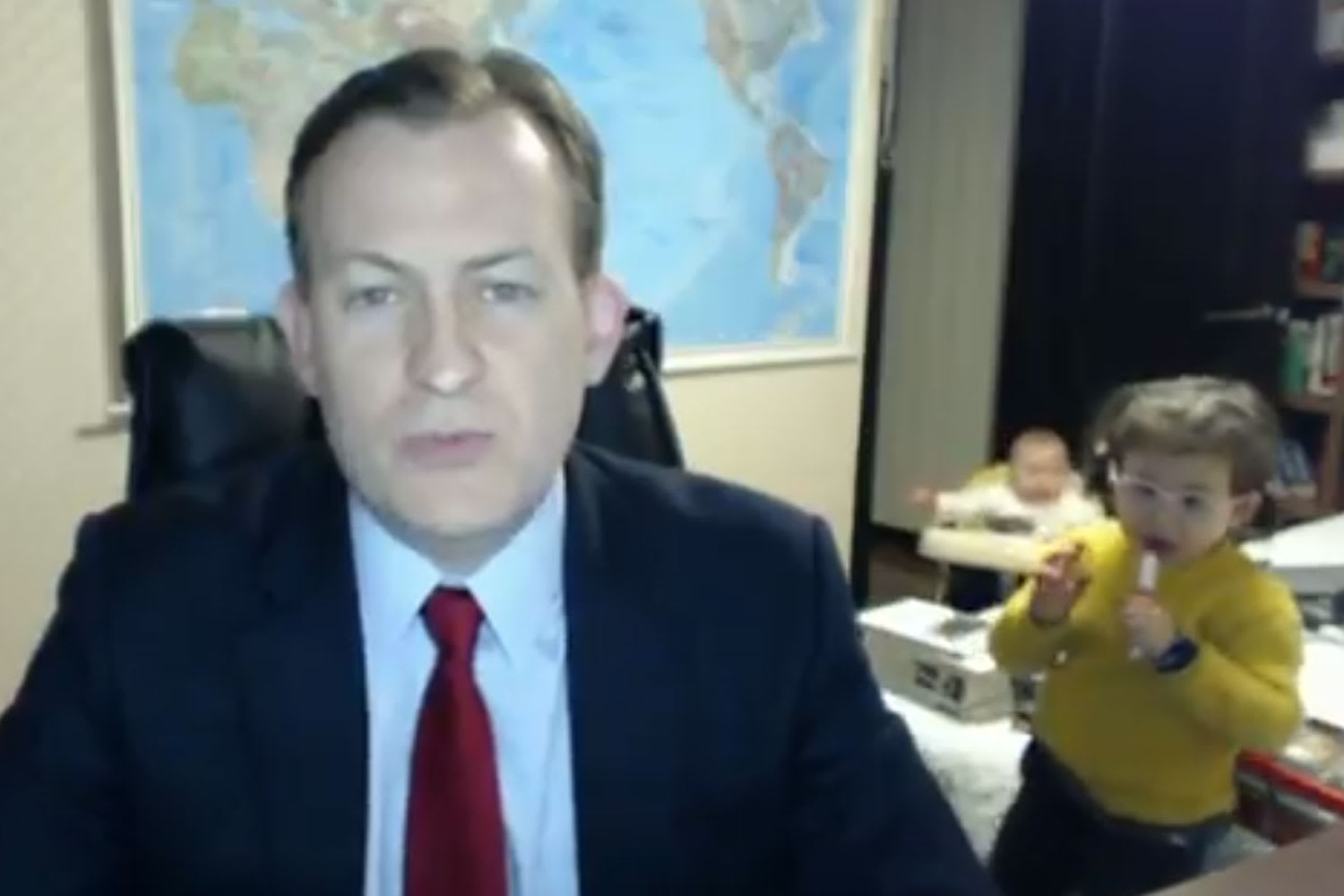It was the surprise hit of the season.
Professor Robert Kelly is an expert on South Korean politics. He was conducting an interview with the BBC from his home office on the impeachment of South Korean President Park Geun-hye when his two young children wandered into the shot.
First, his four-year-old daughter, Marion, literally danced into the room, and Kelly attempted to scoop her behind him with an awkward backhand gesture. Then his infant son, James, came into the room in a walker, followed by the children’s frantic mother, Jung-a Kim. Jung-a scooped up her progeny and hustled them out of the room. This was followed by an awe-inspiring dive as she closed the door to the room from the outside.
Kelly would later explain that his family was watching his live interview on the television in the other room. His daughter, excited to see daddy on TV, recognized the room and decided to join him. The baby then followed his big sister, as he tends to do. When Jung-a saw the children on TV, she sprang into action.
Kelly was embarrassed by this, as most of us would be, but the video of the interview was widely embraced and went viral worldwide. The children are adorable and all working parents can identify with Kelly’s plight; I know I’ve tried to conceal the presence of small children on conference calls! Even stay-at-home parents can identify with trying to multitask when kids can and do get everywhere.
This blooper has propelled Kelly into international stardom. Had his interview gone off as planned, it might have been remembered by a handful of colleagues who share his interest in South Korean politics. Now, his plate will be as full as he wants it to be. There will be more interviews to be sure, as well as speaking engagements and other fringe benefits (as well as the lack of privacy that comes with one’s 15 minutes of fame). But had Kelly known this would happen, would he have acted any differently?
The Midrash in Ruth Rabbah (5:6) discusses this kind of scenario. Boaz saw Ruth gleaning in his field and offered to take good care of her. When mealtime arrived, he gave her some parched grain to eat. The Midrash comments that had Boaz known that his actions would be immortalized in the Bible, he would have provided a lavish banquet.
The Midrash continues with other examples. For example, Yaakov’s eldest son, Reuvein, tried (unsuccessfully) to recuse Yoseif from the other brothers, a fact that is recorded in Genesis 37:21-22. But had Reuvein known that the Torah would record this abortive attempt, he would have redoubled his efforts, hoisting Yoseif out of the pit and carrying him home on his shoulders.
One final example is from Exodus 4:14, where we are told that Aharon, brother of Moshe, was coming to meet him and was glad that his brother had been appointed God’s emissary. But had Aharon known that the Torah would record his reaction, he would have gone out to welcome Moshe with great pomp and celebration.
Each of these people did a good thing. Boaz fed Ruth. Reuven tried to save Yosef. Aharon went out to greet Moshe. But had they realized that their modest efforts would “go viral” for all of history to see, they would have done spectacular things. They would have gone from good to great.
Robert Kelly did a good thing. He’s clearly a loving parent who was caught in a conflict between family and work – a relatable situation for many. But if he had known that this video would get him mentioned on the Orthodox Union web site (as well as more than a few other outlets) and would remain on the Internet forever, would he have acted any differently? Instead of trying to conceal Marion, would he have scooped her up into his lap and told his BBC audience, “Meet my daughter?” When Jung-a took that impressive dive to close the door, would he have said “Thank you, honey?” I’m not suggesting that there was anything wrong with Kelly’s actions, but had he anticipated his fame might he have taken them from good to great?
This is actually a lesson for all of us. I’m assuming that most of us try to be good, at least most of the time. But are we aware of how often our deeds are recorded for posterity? Perhaps not in the Bible, but in other ways.
First, they are recorded literally. Unlike Kelly, most of us won’t become YouTube sensations but we do live online and those tweets and Facebook posts are there forever. Even if you delete something, there are edit histories, archived versions and people who downloaded or took screenshots.
Next, our deeds are recorded in the eyes of others who behold them. Not only can this affect others’ opinions of us (or of Jews in general), it can influence others’ behaviors. Our actions can please others or anger them; they can cause others to emulate us or drive them away.
Finally, our deeds are recorded in that Book-with-a-capital-B that will be consulted after we pass away. When our deeds are tallied, it will be good to have done good things but it will be great to have done great things.
Whether we’re Boaz and Reuven, Robert Kelly and Jung-a Kim, or you and me, one way or another all our deeds go viral. We would be wise to remember the words of Rabbi Yehuda HaNasi in Pirkei Avos (2:1), “Know what is above you: an Eye that sees, an Ear that hears, and all your deeds are written in a Book.” If we do this, we will remember not to settle for goodness but to strive for greatness.
The words of this author reflect his/her own opinions and do not necessarily represent the official position of the Orthodox Union.
